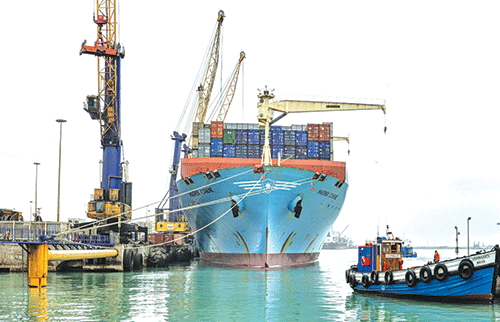Petroleum imports at the Port of Walvis Bay, strategically located as a gateway to Southern Africa, remarkably increased by 50% during the nine-month period ending 31 December, 2023.
This is in comparison to the same time during the previous fiscal year. This figure could increase even more as cargo ships increasingly consider the Walvis Bay refueling option which is part of the preferred alternative route around the Cape of Good Hope.
Cargo ships consider adding about a week to their journeys due to an escalation of attacks in the Red Sea that are severely disrupting global shipping lines. The ongoing Red Sea attacks have already led to shipping delays and increased freight costs in the ocean shipping sector.
“Petroleum imports escalated from 796 277 tonnes in 2022 to 1192 286 tonnes in 2023, underscoring the port’s growing significance as a refueling destination,” stated Namport spokesperson Taná Pesat.
Responding to New Era questions, Pesat noted the surge in vessels calling at Walvis Bay for refueling has had a discernible impact on local port fuel levels.
“In response to the growing demand for bunkering services, Namport has expanded its fuel infrastructure, ensuring a consistent and dependable fuel supply for visiting vessels. It is important to emphasise our commitment to meeting the escalating demand for fuel services while upholding the highest standards of safety and environmental responsibility,” she stated.
Pesat further pointed out that while cargo volumes at Namport’s ports have grown by 3%, including bulk and break-bulk cargo, the handling of twenty-foot equivalent units (TEUs) saw a slight year-on-year decrease of 1%.
Meanwhile, the Port of Walvis Bay continues to witness a remarkable surge in maritime traffic. The upswing in vessel operations encompasses container ships, bulk carriers, and oil tankers, reaffirming the port’s pivotal role in facilitating trade and boosting the domestic economy.
During the third quarter and the nine-month period culminating on 31 December 2023, as part of the 2023/24 fiscal year, the Port of Walvis Bay experienced a noteworthy year-on-year escalation of 32% in vessel calls.
“This substantial increase can be attributed to intensified activities involving container vessels, dry bulk carriers, reefers, and foreign tugs. Furthermore, there was a significant growth of 24% in vessel gross tonnages, while the provision of pilot services to these vessels recorded a remarkable increase of 29% when compared to the corresponding period in the previous fiscal year,” Pesat stated.
She continued that Namport has several significant developments in store for the 2024 calendar year. These include infrastructure expansion projects aimed at increasing port capacity, such as the deepening and widening of harbour channels to accommodate larger vessels.
“Additionally, we are enhancing our digitalisation and automation initiatives to improve operational efficiency. Namport is also actively pursuing partnerships and collaborations to strengthen regional and international trade ties, positioning us as a key player in the global maritime industry,” Pesat added.
The disruptions of shipping in the usually popular Red Sea route have affected more than two dozen ships since November last year.
The vessels have been hijacked or attacked with drones, missiles, and speed boats all exacerbating disruptions to global shipping. It is estimated the Red Sea cargo disruptions can impact as much as 20% of global shipping by volume.
The longer voyage around the Cape of Good Hope translates into increased wages, insurance, and fuel costs for ocean carriers, which has increased overall transport costs that are ultimately passed on to consumers.


